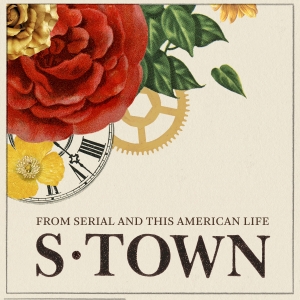
I started listening to podcasts my senior year of high school, partially because I started driving to school, but also because an English teacher insisted I listen to Serial. Immediately, I was hooked. When I heard that This American Life (another great podcast) and Serial were bringing S-Town to the public, I knew it was going to be my next favorite podcast.
Narrated by Brian Reed, S-Town follows the story of an antique clockmaker named John B. McLemore who lives in Woodstock, Alabama (which McLemore dubs Shittown, Alabama). When McLemore emailed This American Life about a potential murder cover up he believed existed in Shittown, Reed took on the case, only to find that the dead body he was looking for was not the one he anticipated. The show explores what it means to be an outsider in the already isolated small towns of the South, both due to external and internal factors. Mental illness, suicide, sexuality, and clock making have the largest presence on the podcast. Oh, and one chapter solely focuses on a treasure hunt.
Although the podcast is certainly non-fiction, it feels like a well-crafted story. Certain aspects of the story that resurface throughout the podcast— like mental illness, time, and Shittown itself— help to form the feel of a real narrative as opposed to an objective report. These themes also work together to paint a vivid picture of John B. McLemore and wrap the reader up in what it means to have known him. Occasionally, Reed will go into explanations about the various ways one can fix a clock, similar to author describing a setting or bringing attention to a symbol that will reappear in the future. These asides, though initially a bit jarring, work to show the beauty of clock-making in the way that John B. McLemore might have seen it and connects the listener to him by sharing one of his few key passions.
Although the narrative was incredibly engaging and well-crafted, there were many times during S-Town where I had to stop the podcast. It wasn’t the fault of the podcast; it dealt very well with the sensitive material they had. S-Town hit remarkably close to home for me, as I saw a friend of mine in John’s story. While I cannot speak directly about the representation throughout the narrative, I recognized so many aspects of Reed’s story, and the stories of John’s friends, to be one that I have seen myself.
The reason S-Town succeeds as a show is not the same reason that Serial succeeded. Serial’s previous success was due to the meticulous analyzing of each piece of evidence and the lack of acceptance for one specific answer as the truth. S-Town certainly builds off of a similar model, but it explores the bonds that we create with one another and how suicide in particular affects those bonds. S-Town has the emotion, the humanity, and the evasiveness of a narrative that Serial can’t capture in quite the same way. That doesn’t necessarily make S-Town the better podcast; the narrative quality instead increases the emotional impact that it has on a listener because it allows for a stronger focus on emotion as a whole.
If you’re looking for a new podcast, something to listen to on the go, or just a good excuse to cry, look no further than S-Town. I just listened to it through a podcast app, but they have an absolutely beautiful website where you can listen to all of the episodes (stownpodcast.com).
